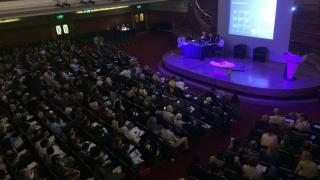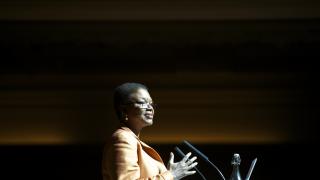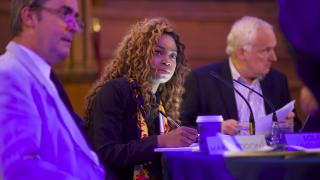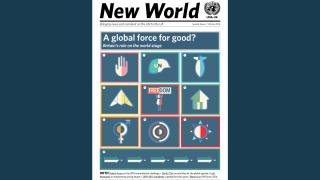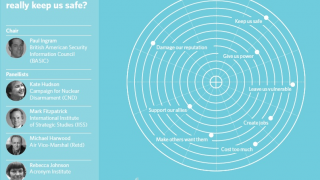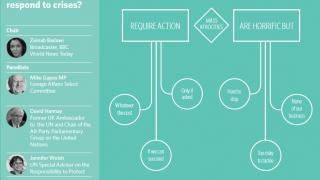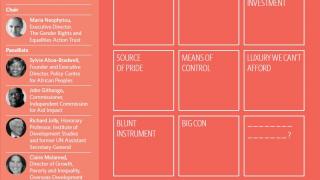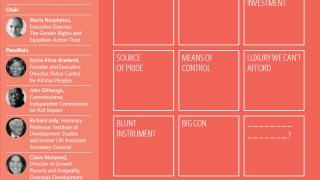
In 2005 – the year of the Make Poverty History initiative, Jubilee Debt Campaign and G8 Gleneagles Summit – millions of people around the world believed that aid, debt relief and sound policies would end extreme poverty.
This was the high-water mark of support for the UN Millennium Development Goals (MDGs). Adopted by governments in 2000, they have been hailed as the world’s most ambitious anti-poverty initiative and with good reason. Significant progress has been made at the global level in reducing extreme poverty, child mortality, deaths from malaria, new HIV infections and the number of girls out of school.
But progress has been uneven, between and within countries. Some goals, like addressing maternal mortality, are unlikely to be met by the target date of 2015. Some groups, such as people with disabilities and the elderly, have been left behind. As a result, there is more cynicism and less consensus on how to tackle poverty today.
The MDGs have been criticised for incentivising governments to pursue the easiest gains, for leaving out issues such as human rights and good governance – crucial to addressing inequality – and for focusing on numbers rather than outcomes. They have also been portrayed as representing business as usual: a top-down, North-South view to development, with a narrow approach to key issues such as women’s empowerment. Today, aid is under increasing scrutiny, due to economic pressures in donor countries as well as growing calls for transparency and accountability in developing states.
As the international community gears up to adopt a new set of goals in 2015, our panellists discussed whether our approach to development is flawed. The session was chaired by Maria Neophytou, whose organisation has been working with the UK Department for International Development on a groundbreaking piece of legislation which aims to ensure that gender equality is always taken into account in development programmes. Each speaker was given just 60 seconds for their opening statement. These are presented here, followed by extracts from the debate. Visit www.una.org.uk/forum for the full recording.
Maria Neophytou (MN): Development cannot be measured by economic growth alone if half the population is left behind. We must consider the roles and responsibilities of men and women in society, so that women can succeed in the public sphere – the work place and politics – and men in the private sphere, in domestic labour and care. Gender has an interesting way of subverting and inverting the relationships between the so-called developed and developing world: in terms of gender equality the UK is still a developing country. The inclusion of a universal gender goal in the new development framework could revolutionise gender equality.
Sylvie Aboa-Bradwell (S A-B): My comments are focused on Africa, my area of expertise, and in Africa, our approach to development is flawed. The foreign aid and the ‘beggary industry’ – our main policies for the continent – are based on the same thinking that made us believe that slavery was good for Africa. Now this mindset is having even worse consequences because things are happening under the false pretence of change and with more disastrous consequences. How can we remedy this? We must all understand that because of the horrific history of the continent, it is essential for Africans to be self-reliant.
John Githongo (JG): Our approach to development is increasingly irrelevant because peace, education and the free movement of ideas, goods, wealth and people make growth happen. The rise of Brazil, India and China has seen the greatest number of people lifted out of poverty in human history. There is now enough wealth to go around, even in some of the poorest countries. Inequality, though, continues to grow. Deepening inequality means greater volatility – politically, socially and economically. The solution? It’s no silver bullet but tackling corruption is vital. Corruption can co-exist with both poverty and growth but in every case, it deepens inequality and undermines the legitimacy of states. We need to breathe life into the UN Convention Against Corruption, passed in 2003, and give it teeth to address issues such as money laundering, trafficking in people and counterfeiting.
Richard Jolly (RJ): Is our approach flawed? Yes. Is it fatally flawed? No. Three problems we need to fix are: we focus too narrowly on poverty and not enough on inequality; we focus too much on GDP and not enough on structures for human development; and there is too much uncritical support for the World Bank and IMF, and not enough for the UN. Three things we ought to do: strengthening global governance and making it more humane; providing more multilateral aid to operational parts of the UN like UN Women and UNICEF; and focusing on measures to reduce inequality.
Claire Melamed (CM): Increasingly I wonder whether calling what we do development is useful. I think ‘development’ is now confined to aid ministries in donor countries. It is very difficult today to point to a group of countries and say they are ‘developing’. If you are in Mozambique and you are trying to run a health service, this is matter of health policy. If you are in Tanzania concerned about youth unemployment, your concerns are shared by politicians across Europe. If you are in India thinking about financial regulations that will attract investment, so are many others around the world. What we have now is a series of common problems and of objectives that governments pursue individually and collectively. The fact that the new set of development goals will be universal – they will apply to all countries – is an important change.
Michael O’Neill (M O’N): Our approach to development is certainly not fundamentally flawed – it is achieving results. But our system could be improved. Although it remains essential, we cannot focus on poverty alone. We need to look at human rights and good governance and, as UNDP is doing, help states to enhance their resilience to crises. We must realise that there isn’t a single approach to development. Flows of public money remain indispensable for low-income countries. They are less important for middle-income countries, which may be more concerned about inequality. And we must continually try to enhance the effectiveness of what we are doing.
Q & A
Should we learn from countries like China, which have stayed away from policy prescriptions from international institutions, and achieved phenomenal economic growth and poverty reduction? (Kavita Dattani)
S A-B: China is an interesting example for Africa. We can learn from them that we do not need to be framed as poor people who have to rely on others to get ahead. But we must avoid China’s approach to human rights and good governance. We must also remember that not all countries are at the same point in their development. In Africa, we have an utterly unique and horrific legacy – the continent has been broken by centuries of the slave trade and suffered from 50 years of corrupt systems put in place by puppets serving foreign interests. So in the case of Africa, there is no framework or template, it is about people taking control of their own lives.
M O’N: China itself recently produced a policy paper on the development assistance it provides, which indicates that it recognises its approach needs to improve. It is one of a growing number of ‘non-traditional’ donors, such as South Korea and Saudi Arabia. Aid from these countries quadrupled between 2000 and 2011 and they have enormous lessons that can be shared, which may be more relevant than our own experience in Europe.
There seems to be a growing trend of ‘voluntourism’ – young people with little experience going to developing countries for short stints. Does this really have any positive effects on global development? (Nicoletta Primo)
RJ: I started my own adult life, not quite as a volunteer, but quite unexpectedly working in Kenya, which changed my trajectory completely. I think that volunteering still has an important role to play and I hope that it will be supported by governments. Volunteering schemes will become ever more important as demographic changes around the world will require a massive enlargement of care.
JG: We had a phase where volunteering became aid, aid became an industry and then an industry that was often self-perpetuating. I think we are pulling back from that now, especially with the young generation. We are returning again to the spirit of volunteering, of human beings connecting with fellow humans around the world.
I heard at a conference that the new set of development goals will not include malaria. Is there a risk that progress will be reversed? (Audience, no name given) and, countries often say that limiting carbon emissions will hinder their development. Is our approach flawed because we value economic growth over tackling climate change and building a sustainable future? (Audience, no name given)
M O’N: It is the intention of the new development agenda to avoid precisely this artificial bifurcation between issues of climate and issues of poverty. They will be called ‘Sustainable Development Goals’ and there are several targets on various aspects of environmental protection, much more than in the MDGs.
As for dropping certain issues, if anything, the draft of the goals includes too much. Instead of eight MDGs, the current text contains 17 goals with over 200 targets. If we are to achieve an agenda that will attract international consensus and support and that will mobilise enthusiasm, I think we need something more targeted but which continues to address key areas of health and so on.
S A-B: Can I just say that on issues like fighting malaria, it is the responsibility of governments to do that, not ours. We are not encouraging them to do so nor helping accountability in these countries by giving them this kind of assistance. Would the French Revolution have happened if people had been given bread?
CM: I completely agree that governments must be responsible for, and accountable to, their people. Anything that undermines that isn’t good. But this question of whether aid works, it’s like asking ‘does policy work?’ or ‘does transport work?’. There are good ways to do it and bad ways. There are examples of where aid has been positive, where it has supported states and achieved dramatic improvements in peoples’ lives in a way that reinforces the functioning of government. Sadly, there are examples of the opposite happening. I am not sure one can draw general conclusions about whether aid is good or not. It depends how it’s done, with whom it’s done, in what sector, for how long and with what relationships.
JG: I think we have to remember that when we talk about diseases like malaria in certain countries, we are really talking about a governance crisis, with homegrown roots and homegrown solutions. Malaria prevention, for instance, is as simple as bed nets, which cost almost nothing. The cost of a presidential jet would be able to provide nets for the whole population in some countries. It is a simple issue really.
RJ: But diseases like smallpox would be with us today if there had not been a global approach, led by the UN. These diseases must be eradicated everywhere if they are to be eradicated at all. Today, it is the same with polio and guinea worm.
How can we hope for development when free market ideology still dominates? (Audience, no name given)
M O’N: The largest source of financial support for developing countries will be the private sector. It is less about dismantling the economic structure and more about making sure there is regulation, corporate social responsibility and so on.
RJ: It has always been the World Bank and IMF, and not the UN, who have promoted this ideology. The UN has always been multi-disciplinary, concerned with health, education etc. as well as with human rights in development. We need to build in human rights into all our global governance structures – that should be a major 21st Century goal.
How can the UN improve its data collection? (Audience, no name given)
CM: Over two million people have responded to MYWorld, the survey that the UN and ODI did on the new goals. Consistently high on the list – number three I think at present – is the desire for an honest and responsive government. It is shared by men and women from all countries and age groups. It is a desire that has not been captured well in initiatives like the MDGs; I hope we will do better this time. Monitoring and evaluation, all those boring technical things, are at the heart of this. We need to have systems that can make decisions in a way that people understand and can influence, and data that will allow people to know whether or not their government is actually doing the things it promises.
JG: Development is about local ownership, accountability and governance. Aid should bolster that. We are all part of the UN and we have a responsibility to ensure that countries respect international treaties and obligations because slippages in this regard can lead to abuses, poverty and crises. The UN still has that essential role because it belongs to all of us.


